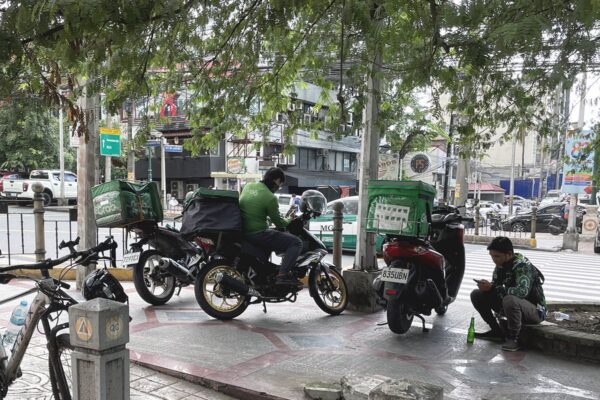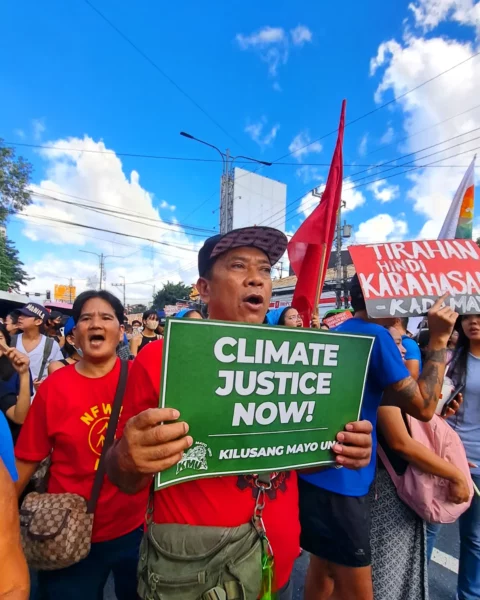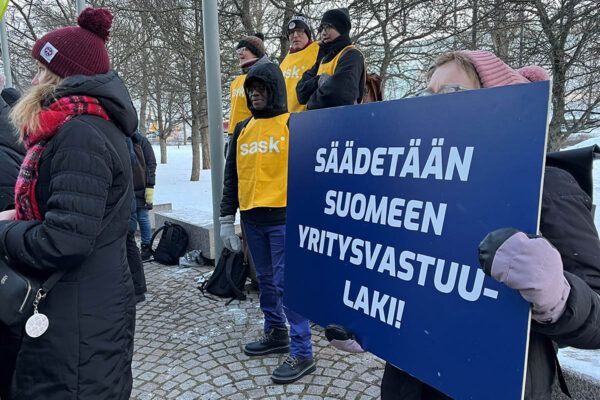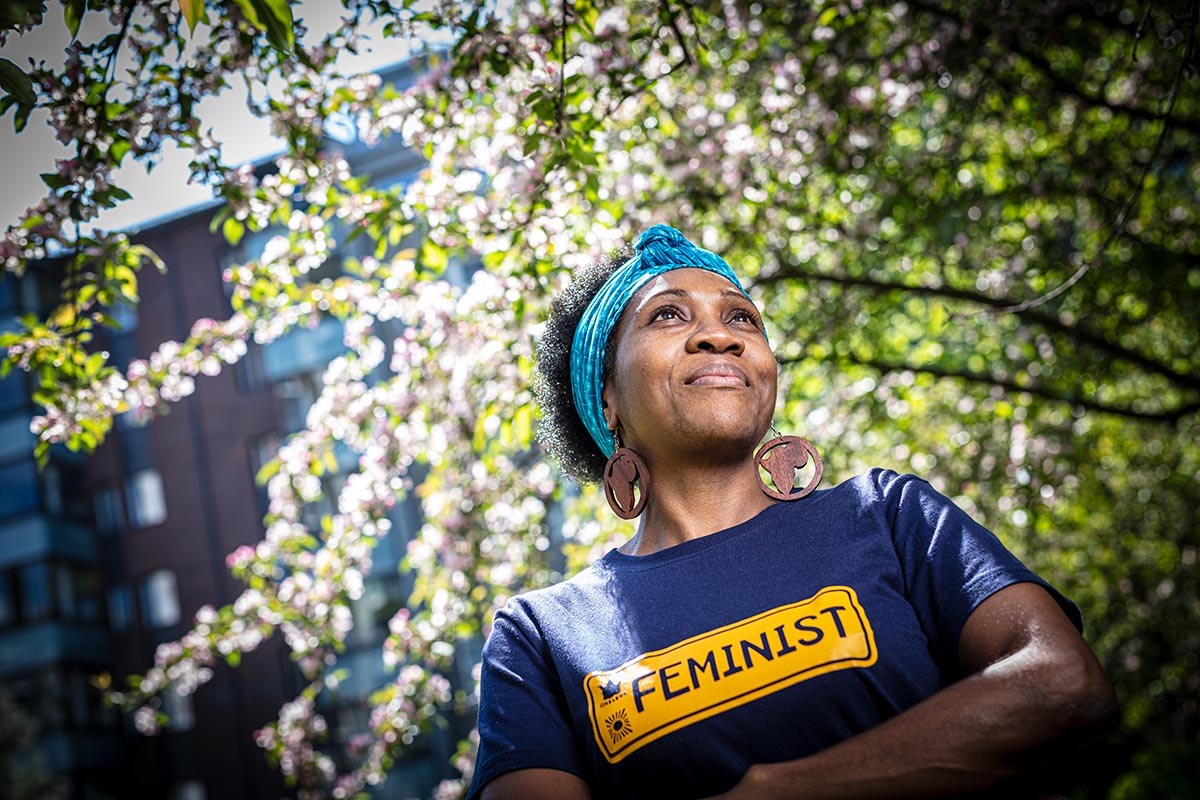
The International Labour Organization ILO has defined non-discrimination as one of the fundamental rights at work. Yet people are discriminated against based on gender, sexual orientation, disability, ethnicity, age or worldview, for example. Hundreds of millions of people suffer from discrimination at work.
Gender equality and minority rights at the heart of SASK’s work.
In SASK’s work, emphasis is placed on:
- Equal participation and leadership in union work
- Gender-responsive occupational safety and maternity protection
- Eradicating violence and harassment from working life
- Defending the rights of minorities
Balanced participation
The opportunity for all employees to participate in trade union activities makes everyone’s voices heard and makes unions genuinely look like their members. Unions have for a long time been seen as bastions of middle-aged and older men, but change can be seen around the world. Involving a diverse group of people requires measures such as training women and young people and welcoming different minorities into the work.
At their best, diverse organisations are movements that attract new people and fresh perspectives and are natural and safe to join. When everyone’s issues are considered and a wide range of people are heard, the understanding of issues that need to be addressed increases.
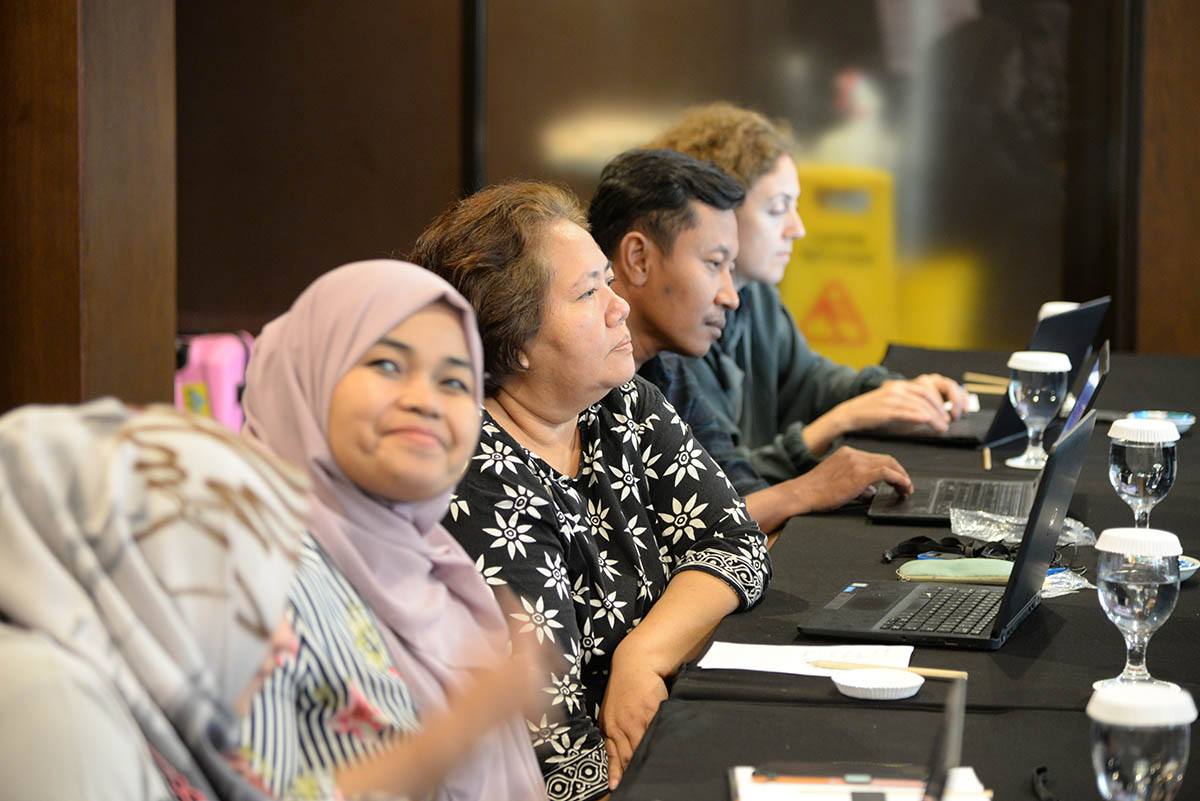
In 2023, almost half men and half women participated in the activities of projects supported by SASK. The growth in young people’s activity has also been steady in recent years.
Equal participation is strongly emphasised in all SASK projects during the period 2022–2025.
Equitable management
The essence of democratic, member-oriented organisations includes equal opportunities for leadership and decision-making.
When all groups of workers are represented in decision-making, it is more likely to bring about a tangible improvement in everyone’s working conditions and well-being.
In some situations, women’s, young people’s and different minorities’ own activities are important, but there is a risk that matters important to them will get stuck in separate committees.
Developing practical skills and self-confidence go hand in hand. They are particularly needed by those groups that have been under-represented in their own unions.
With SASK’s support, partners have implemented, for example, a training programme for women negotiators and international youth networks that bring new dynamics to trade union work.
Equality in leadership and decision-making is taken into account in all SASK projects.
- Approximately the same number of women and men participated in the project activities supported by SASK and about one per cent of others.
- Women’s participation and leadership was strongest among domestic and public sector workers due to the large number of women employed in the sectors. Although some unions are relatively small, thanks to their visible advocacy work, they are well placed to influence the general atmosphere and activities of trade union movements in their home countries.
- The most balanced gender distributions are found in agriculture and food industry, as well as in education. There were still more men in manufacturing, construction and transport.
- However, strong efforts to be active among all groups of people were observed in all sectors.
- For example, the Namibian Construction Union supported women’s promotion to managerial positions, and in Mozambique’s transport sector, women’s training as train drivers, truck drivers and stevedores brought more options to the range of professions and, in many cases, better income.
- Some partners ensure equal leadership positions with quotas written into the union statutes. Most often, however, decision-making positions are reached through systematic training programmes, such as those in the industrial sectors of Eswatini, Lesotho and Malawi. Inspiring female leaders also serve as role models, especially for young people; A good example of this is the Zimbabwean Musicians’ Union.
- Gender equality training for men was an eye-opener and shaped attitudes in seven countries and six sectors in Africa and Asia. The Indonesian Construction Union has already trained more than a hundred men, who describe the effects as transformative. In the private service sectors of Ghana, Kenya and Mozambique, as well as in the Ugandan public sector, men have been able to dismantle old-fashioned practices in their peer groups.
- Equal participation and leadership significantly impact the content of activities and the attractiveness of unions. When all kinds of people feel welcome and get their issues across, unions are credible influencers.
Gender-responsive OSH and maternity protection
Gender-responsive occupational health and safety draws attention to the different needs of different genders from the perspective of a healthy and safe working environment.
- Does everyone have sufficient tools and protective equipment suitable for their bodies, safe sanitary facilities and undisturbed commuting?
- How can we secure work during pregnancy so that the work does not pose risks to the mother or child?
- Are there different risks related to work ergonomics or psycho-social factors for different genders, and how are they addressed?
- Are accident risks and exposures to reproductive health hazards the same for everyone?
- Does everyone have access to occupational health services?
- Who decides on occupational safety and health instructions and measures?
Maternity security means much more than maternity leave and parental leave. Of course, attention should be paid to their sufficient length, and in recent years, SASK’s operating countries have succeeded in extending family leaves in many places.
Safe maternity also includes:
- Health protection in the workplace
- Non-discrimination in parenthood
- Job security
- Support for livelihoods and health services
- Childcare arrangements
- Breastfeeding breaks in the workplace
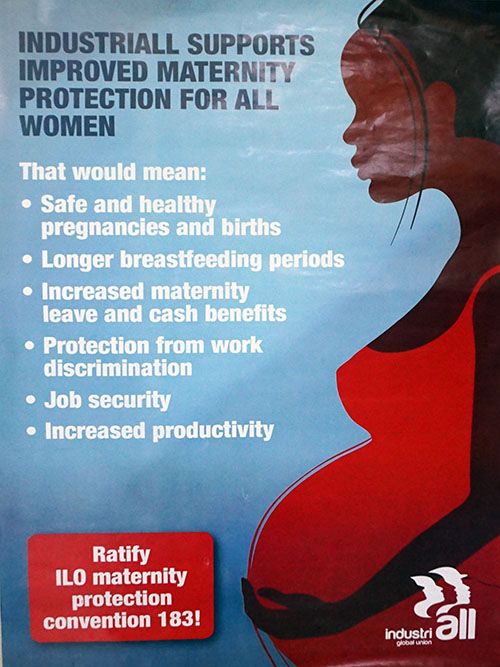
Occupational safety and health are strongly represented in fourteen SASK projects.
- Women’s participation in the labour market is facilitated by flexible working hours, breastfeeding breaks and childcare arrangements, for example in Namibia’s construction sector. The burden on people with families is reduced by the right to visit maternity and child health clinics and care for sick children during paid working hours, for example, in Malawian industry and construction sites in Zambia.
- In addition to maternity protection, some partners have started to advocate for parental rights more generally. Six countries have succeeded in extending paternity leave or negotiating for it for the first time. For example, in the tourism sector in Malawi, the transport sector in Mozambique and the metal and mining industry in Indonesia, fathers get at least a few days of paid leave.
- Several sectors have negotiated tools and clothing suitable for everyone, as well as appropriate and safe social facilities. CCTV cameras have been installed in healthcare facilities in Uganda to protect workers.
Eradicating violence and harassment
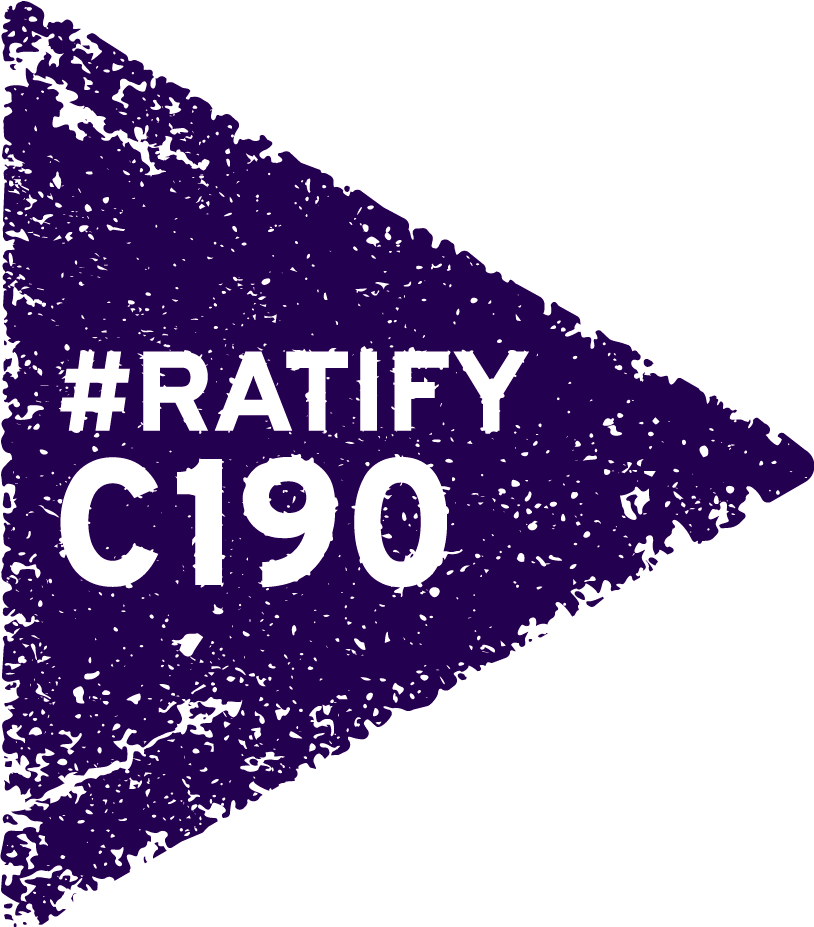
Since 2019, eradicating violence and harassment from working life has become even more visible with the adoption of ILO Convention C190. In addition to the actual place of work, the convention prohibits violence and harassment in sanitary, dining and break rooms, on business trips and when commuting to the workplace. It also applies to accommodation facilities, events organised by the employer and to work-related communications.
The agreement covers all employees, regardless of the nature of the employment relationship. It also covers trainees and apprentices, job-seekers and volunteers, employer representatives and supervisors.
Special attention is paid to groups of workers who are at greater risk of harassment and violence. They include, for example, night shift workers and those working alone, teachers, and workers in the service sector, domestic workers and entertainment sector. The ILO Convention also includes support measures for those who have experienced domestic violence.
Employers’ and workers’ representatives are responsible for:
- prevention of violence and harassment
- protection of victims
- establishment and implementation of complaints and compensation systems
- education and information on the subject.
Harassment and violence are serious violations of human rights. No one should be subjected to them at work.
Zero tolerance clauses are negotiated in collective agreements and harassment contact persons are trained at workplaces. Trade unions and SASK’s international partners create principles and practices for safer spaces for their own operations.
The total of 22 of SASK’s projects promote the theme through training, campaigns and influencing legislation.
- Training and information against violence and harassment continued in many forms. Face-to-face meetings, online training courses and webinars were organised in almost all partner countries, as well as brochures, posters, videos and training materials were distributed. The training package, created jointly by international trade unions, is already in use in 14 different languages, and user-friendly bulletins are also benefiting employees around the world.
- The campaign to ratify and domesticate ILO Convention C190 against gender-based violence and harassment paid off! The treaty was ratified by the Philippines, Lesotho, Rwanda and Uganda. In the countries that had already ratified the Convention, South Africa, Namibia and Nigeria, the unions focused on monitoring its implementation in legislation. In addition, there are countries in all SASK’s regions of operation where the ratification process is almost complete, and results are expected in the next few years.
- Negotiations to include anti-violence and harassment clauses in collective agreements have continued. In 2023, the Indonesian metal, mining and transport unions, the public sector federations of Brazil, Guatemala and Colombia, as well as textile workers in Lesotho, among others, achieved zero-tolerance clauses and intervention mechanisms in at least company-specific agreements and guidelines.
- Several partner organisations have updated their gender equality programmes to include anti-harassment and violence guidelines and case handling mechanisms. Many of the organisations that have not yet had a gender equality programme have drawn it up and communicated it to their members. Action against harassment and violence attracts especially young women and those who identify with minorities to join unions.
Position of minorities in working life
Rights of persons with disabilities
People with disabilities are generally very under-represented in working life. Only a few per cent of the world’s persons with disabilities receive education and thus gain the prerequisites for working life. People with disabilities in working life are often in a weaker position than others, for example, their pay may be lower. Women with disabilities in particular face enormous attitudinal, physical and information barriers to equal opportunities in working life. Disability is still seen as a stigma in many countries. Awareness of the rights of persons with disabilities is often low and discrimination may be deep-rooted.
All human rights treaties and declarations also apply to persons with disabilities. However, the rights of people with disabilities have not been realised in many ways, including in working life.
According to the UN Convention on the Rights of Persons with Disabilities, persons with disabilities have the same rights as others. This includes the right to education, work, independent livelihood and social activity.
Trade unions can promote equality and promote the right of people with disabilities to education and employment.
The position of people with disabilities in working life can be promoted, for example, by:
- Enabling education for persons with disabilities
- Supporting part-time work
- Making reasonable accommodations in the workplace, for example by purchasing assistive devices and improving the accessibility of the working environment
- Collective agreements negotiated by trade unions that guarantee equal treatment for all
- Raising awareness of disability and reducing prejudices
- Improving social protection systems, thereby reducing extreme poverty.
The first project started in Zambia in 2023, initially commissioning a study on the position of persons with disabilities in working life and the role of unions in improving the situation. In accordance with its results and recommendations, support was given to joint training for trade unions and disability organisations in order to increase mutual understanding, joint advocacy work and making the unions’ own activities accessible and accessible.
The Zambian project has progressed well. Similar work will begin in Brazil and Indonesia in 2024.
Rights of sexual and gender minorities
Sexual minorities refer to non-heterosexuals. Gender minorities include non-binary, transgender and intersex people. These groups comprise an estimated 5–10% of the world’s population. There is no precise information, because in many places expressing one’s identity leads to discrimination, harassment, violence or even the death penalty.
Information on the position of these minorities in the world, on the other hand, exists, and it makes a stark reading. In no fewer than 68 UN Member States, same-sex sexual activity is still a criminal offence. In 11 countries, it is punishable by death. Only 74 countries have legislation protecting their citizens from discrimination based on sexual orientation.
There is even less statistical data on gender minorities. It is known that transgender and intersex people are exposed to violence, isolation and discrimination, which for many begins in childhood. In many countries, they are victims of health violence, which means that they undergo unnecessary and involuntary medical procedures. Being transgender was removed from the WHO classification of mental and behavioural disorders as late as 2019.
In working life, persons belonging to sexual and gender minorities often face difficulties. It is more difficult for them to find employment than for people who do not belong to these minorities. They are more often employed in short-term or part-time jobs or unemployed. In addition, their salaries are often lower, and income development is lagging. Many are forced to hide their identity for fear of being fired or otherwise discriminated against.
The role of the trade union movement is to defend all its members and to look after the interests of all workers.
Unions can influence the content of legal protection and collective agreements and encourage everyone’s participation and get everyone’s voice heard by creating safer spaces and activities that support diversity. They can educate their members about minority rights to promote a change in attitudes.
SASK participates in the LGBTI workers network’s support pool to support the work of Global Union Federations for the rights of sexual and gender minorities.
- The situation and rights of persons with disabilities in working life have been considered, for example, in the Zimbabwean Musicians’ Union and in the industrial sectors of Malawi and Lesotho. Unions promote the employment of people with disabilities, negotiate equal working conditions for them and reasonable accommodations, such as workplace transport.
- In Zambia, trade unions and disability organisations launched a joint pilot project based on research, in which they learn about the working life situation of people with disabilities and ways to improve it, and influence employers and authorities. Similar research and activities were prepared in Brazil and Indonesia.
- The rights of sexual and gender minorities were addressed, for example: In the public sector of the Philippines, the transport sectors of India and the education sector union of Eswatini. SASK prepared the support measures launched in 2024 for the activities of the joint LGBTIQ+ Workers’ network of Global Union Federations.
- Focusing on the position of migrant workers, e.g. South African wineries continued. In addition, the entire construction project in India and Nepal focuses on improving the position of people going to work abroad and returning from there.
- The rights of informal labour are reflected in all projects supporting domestic workers. In Nepal and Southern Africa, community health workers and their unions are supported in their efforts to gain recognition as official health workers and with it humane working conditions and conditions. Zimbabwean musicians are working to get proper regulation for the industry.
- Seasonal, intermittent, temporary and platform workers as well as others working in vulnerable employment relationships are supported by, for example: Mozambique’s forestry sector, industrial sectors in many countries, as well as India’s transport sector.
- Members of indigenous peoples and others discriminated against because of their origin have been brought within the scope of the unions’ activities in Nepal’s health and education sectors (Dalits) and in the service sectors in Latin America (indigenous peoples and people of African descent).
Forms of discrimination
Discrimination on grounds of ethnicity and social class
There is discrimination against different minorities in SASK’s project countries. Many groups of people are also in a very vulnerable position in the world of work.
Examples of discrimination faced by minorities in the world of work:
- Lower wages for indigenous and people of African descent compared to the majority population in Latin America
- Ethnic background or caste making it difficult to get an education or find a job in countries such as India and Nepal
- Unequal distribution of wealth and property based on ethnicity, including in South Africa.
Multiple discrimination
Intersectoral discrimination means that a person is discriminated against because of more than one characteristic. For example, if a person is an Afro-Colombian, low-educated woman from a poor social class who also has a disability or sexual minority identity, she is most likely to end up being discriminated against on multiple grounds.
Discrimination against migrant workers
Migrant workers who move temporarily to another country for work often face discrimination. They are at high risk of becoming victims of discrimination and exploitation. At the same time, their chances of seeking and receiving help in a foreign country are poor.
Many migrant workers come from poor backgrounds and ethnic groups with limited access to education. Illiteracy is one of the factors that exposes migrant workers to forced labour, for example. There are international agreements to safeguard their rights, the implementation of which SASK and its partners promoted.
For example, many people leave Nepal and India to work in Middle Eastern countries in the hope of earning a living wage. A glaring example of their abuse was seen during the men’s football World Cup in Qatar in 2022. Since the end of the Games, the situation of migrant workers there has deteriorated again.
SASK is improving the position of construction workers leaving Nepal and India for migrant work through a project that has resulted in a wide range of improvements and forms of support.
Read more about SASK’s migrant work project in Nepal and India
What is the role of SASK?
As a working life human rights organisation SASK is committed to promoting equality and non-discrimination. The UN’s Sustainable Development Goals provide the framework for operations.
With SASK’s support, the principles of the ILO and the global trade union movement will strengthen the trade union movement in the project countries in their work to promote equality and non-discrimination in working life. We aim to raise awareness of the importance of equality among unions in the Global South and to support their work for it. It means support for education, strategy work, campaigning and advocacy related to equality and non-discrimination. SASK supports local trade unions to act in ways they define themselves.
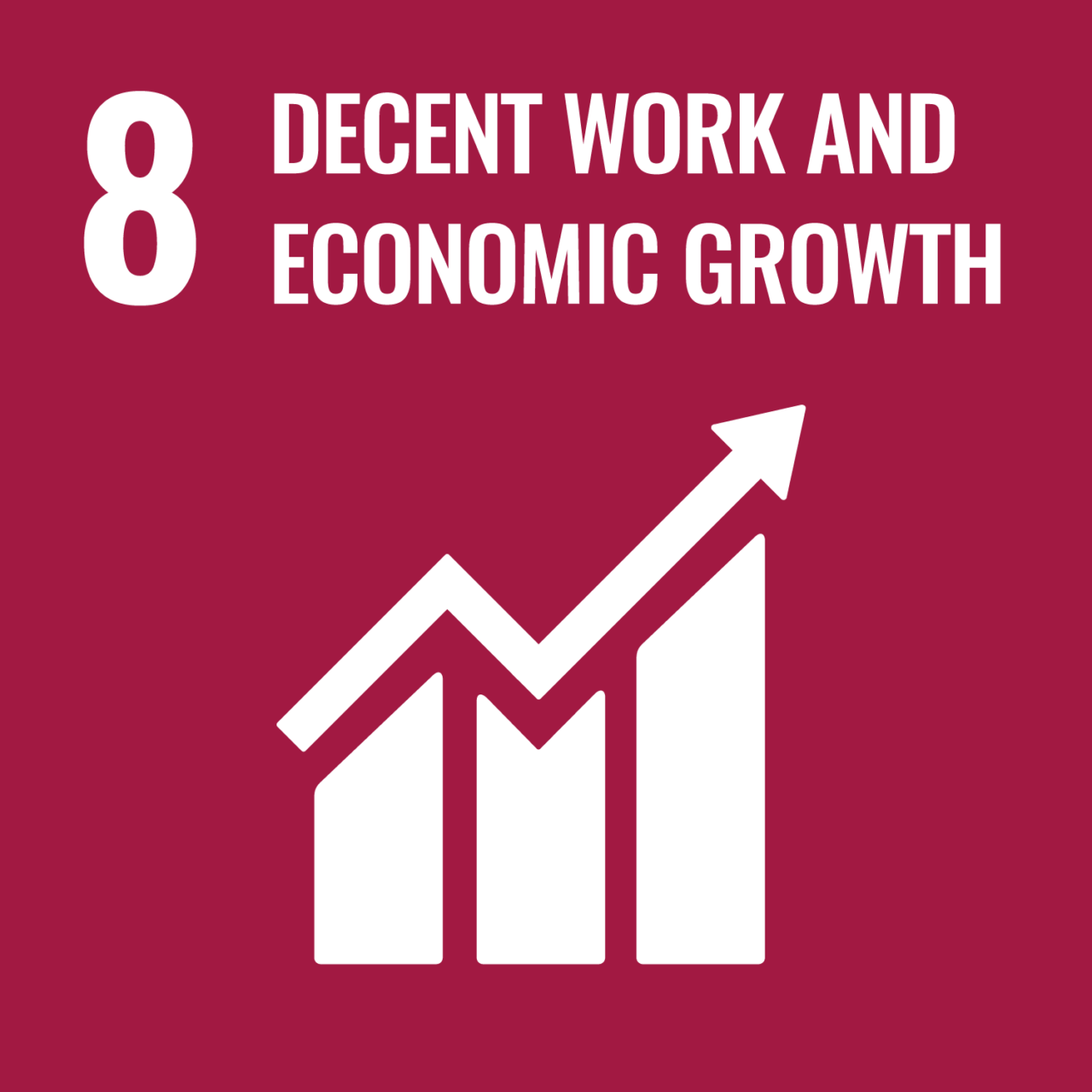
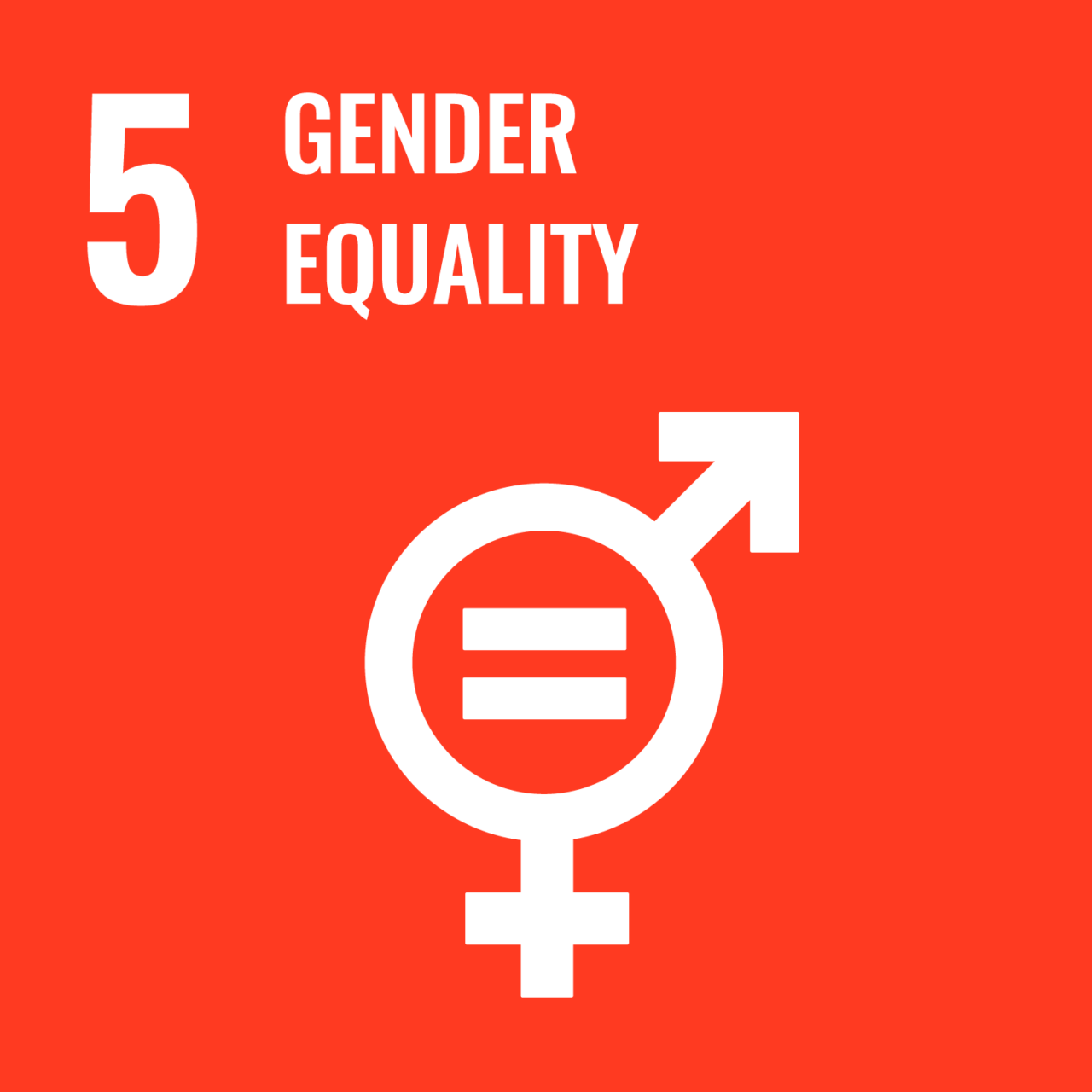
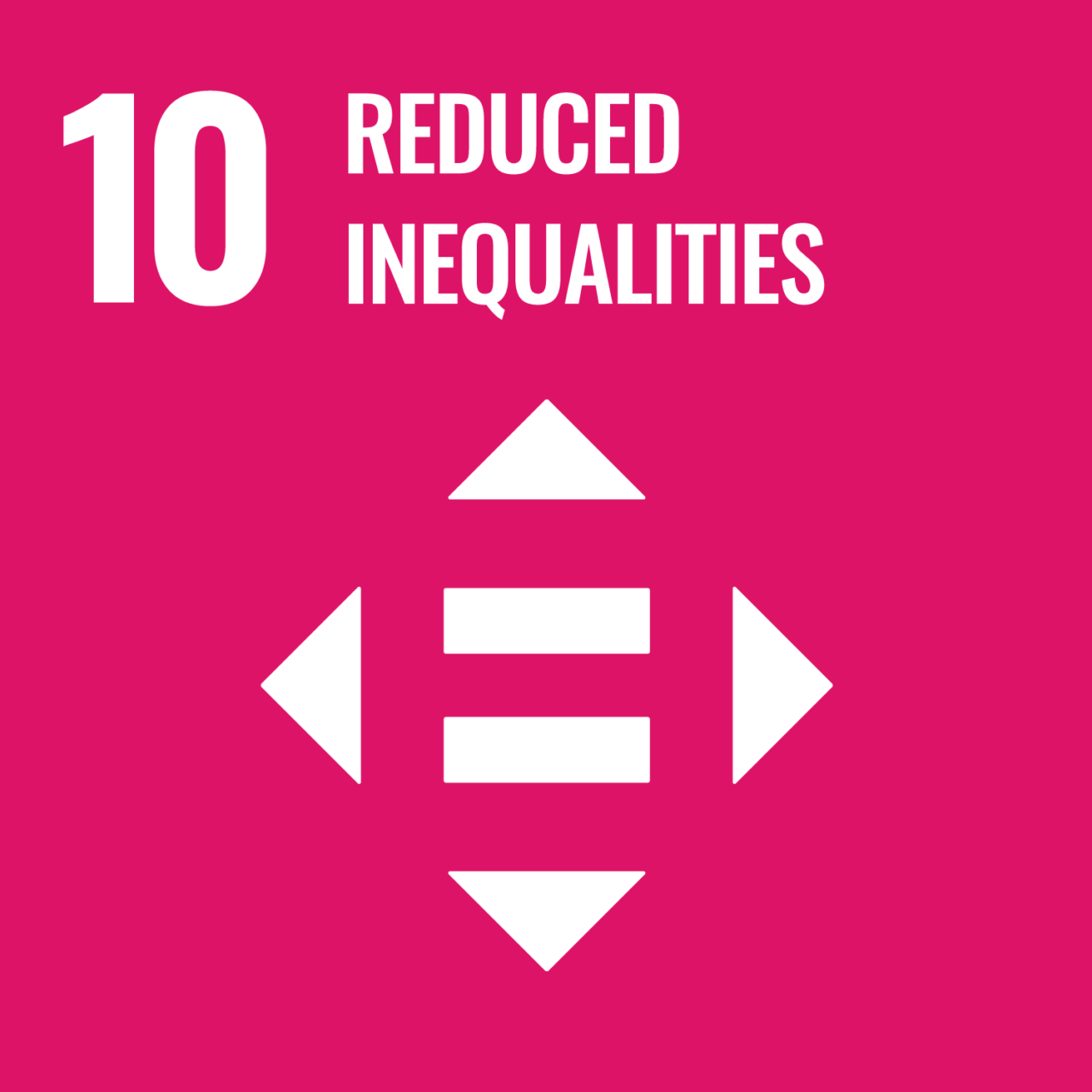
Networks and working groups
SASK networks with the international trade union movement on issues related to equality and non-discrimination. Important partners are trade union solidarity organisations, especially in the Nordic countries and the Netherlands.
Together with project partners and other actors, experiences and strategies are exchanged, studies are commissioned, and cooperation is coordinated to maximise its overall impact.
In SASK’s domestic operations, equality and non-discrimination are visible in trainings and campaigns, for example. All SASK’s own operations in Finland and around the world have zero tolerance for harassment, inappropriate treatment and violence.
Harassment contact person activities are constantly being developed and expanded.
